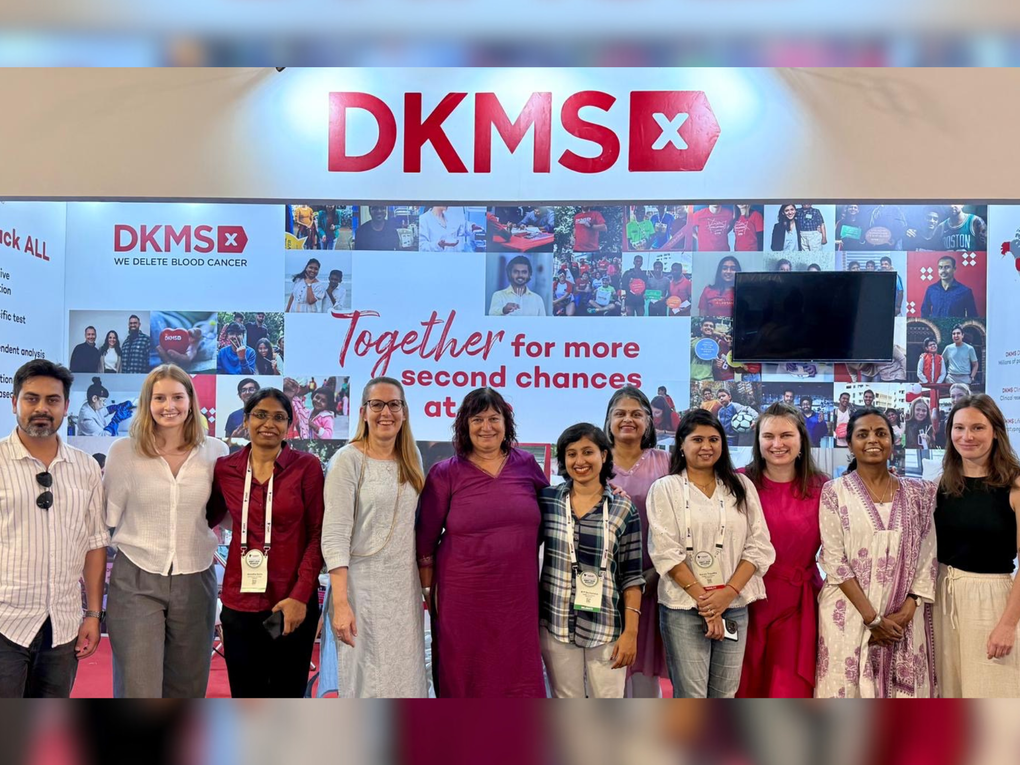
A recap from the 6th annual meeting of the ISBMT in India
The congress covered a wide range of topics – from educational days for early-career physicians to dedicated tracks for nurses, data managers, apheresis team members, and pharmacists, as well as engaging sessions for patients and caregivers. In retrospect, the presentations proved to be highly interesting and valuable for the various target groups.
Also, colleagues from DKMS Asia, DKMS Foundation India, DKMS Life Science Lab India, and DKMS Registry were part of the program. Our activities underline our mission to enable therapies for blood cancer patients, improve donor selection, access to transplantation, and treatment outcomes in emerging countries.
The power of molecular MRD monitoring in India
Dr. Mayur Parihar from our partner at Tata Translational Cancer Research Center (TTCRC), Kolkatta gave an update on the Next Generation Sequencing (NGS) assay HemaTrackTM ALL for high-sensitivity MRD monitoring, highlighting its potential to enhance the precision of risk assessment. With this new assay, a robust genomic method for MRD monitoring will become available by the end of 2025.
Since risk stratification is important to monitor treatment in acute lymphoblastic leukemia (ALL), a robust and cost-effective test for Measurable Residual Disease (MRD) should be available for pediatric ALL patients at cancer centers in India.
MRD is the most significant predictor of outcome and is used in response-based risk-stratified treatment of ALL, as it provides a highly sensitive measure of residual leukemic cells remaining after therapy. MRD levels guide treatment decisions by identifying patients at higher risk of relapse.
Read more about this diagnostic tool here.
Improving probabilities to find unrelated donors in India
When patient and donor match in the alleles of particular population-specific human leucocyte antigen (HLA) genes, an optimal transplantation outcome can be achieved. Since for many patients no matched sibling or suitable related donor is found, registries of voluntary donors for unrelated hematopoietic stem cell transplantation (HSCT) have been established worldwide. At DKMS, we assessed the benefits of our current donor pool and analyzed needs for the future at various levels, especially in India.
A presentation from the DKMS Registry highlighted how the search for unrelated donors will become easier, faster, and smarter – marking a significant step forward in simplifying this critical process. Also, new data on the matching probabilities of eight Indian groups in the donor pool of the DKMS Foundation India (find the poster here) were shared, as well as new insights into the shortage of unrelated blood stem cell donors and the reasons for their unavailability. This highlights the important role of the DKMS Foundation India in bridging this gap.
Healthcare in India remains a challenge in terms of affordability, accessibility, and availability. Our DKMS Access to Transplantation (ATT) program was designed to address these type of challenges in low- and middle-income countries. Its significant impact in India from 2021-2024 was presented during the conference and highlighted how we are giving hope for a better future.
References
1 Parihar, M., HemaTrack: Next Generation Sequencing Assay for High Sensitivity Measurable Residual Disease (MRD) Monitoring in Acute Lymphoblastic Leukemia, Oral Presentation presented at ISBMT 2025.
2 Walker A. and Tripathy A., Simplifying Unrelated Donor Search: Easier, Faster, Smarter! Oral Presentation presented at ISBMT 2025.
3 Chandrashekar R, Agarwal N., Paul P. Addressing the Shortage of Unrelated Blood Stem Cell Donors in India: The Role of DKMS Foundation in Bridging the Gap, Poster 110 presented at ISBMT 2025.
4 Solloch, U.V., Madhusoodhanan, C.K., Lange, V., Sauter, J., Jagannathan, L., Fernández-Viña, M.A., Paul, P. Matching probabilities of eight Indian population groups in the donor pool of DKMS Foundation India, Poster 79 presented at ISBMT 2025.
5 Dechamma, M. P., Chandrashekar, R., Agarwal, N., Paul, P. Exploring the reasons for unavailability in unrelated blood stem cell donors, , Poster 107 presented at ISBMT 2025.
6 Dontula, S., Jothi, K., Kumari, R., Agarwal, N., Paul, P., Landwehr, R., Schmidt, A.H., DKMS Access to Transplantation (ATT) Program: Giving Hope for a Healthy Future, Poster 24 presented at ISBMT 2025.